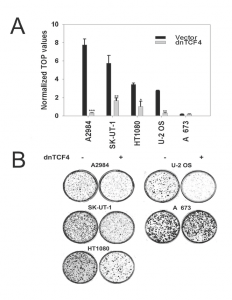Targeting dysregulated developmental pathways in cancer

Downregulation of Activated Wnt Signaling in Human Sarcoma Cells by a dominant negative TCF4 transcription factor inhibits TCF (TOP) luciferase reporter activity (A) and cell proliferation (B) without effects on Wnt negative A1673 sarcoma cells. (Vijakumar et al, Cancer Cell 2012).
Our early studies of retroviral oncogenes led to the discovery of the first normal function of a human oncogene (sis/PDGF). We subsequently characterized a number of human oncogenes involved in growth factor signaling pathways including targets of now approved drugs and several in clinical development. More recently, our investigations of oncogenic signaling have focused on developmental pathways including Wnt and Hippo, which are activated in a variety of human tumor types. We established that Wnt activation by an autocrine mechanism contributes importantly to a wide spectrum of human malignancies including breast ovarian and lung carcinomas and sarcomas. The figure shows how downregulation of autocrine Wnt signaling in Wnt activated human sarcoma cells inhibits both a reporter for Wnt transcription and the proliferation of Wnt activated tumor cells. We are presently investigating how Wnt activation contributes to the transformed phenotype of such tumors as well as the Wnt target genes responsible. Hippo is a negative growth regulatory pathway, whose inhibitory effects can be abrogated by loss of function of tumor suppressor genes, Nf2 and Lats2, or by oncogenic activation through amplification/over expression of the transcription factor, YAP. We are currently investigating how TEAD/YAP transcriptional activation induces transformation as well as the Hippo target genes responsible. Finally, we are involved in efforts to identify small molecule inhibitors that specifically block this oncogenic pathway and their mechanisms of action.
.
